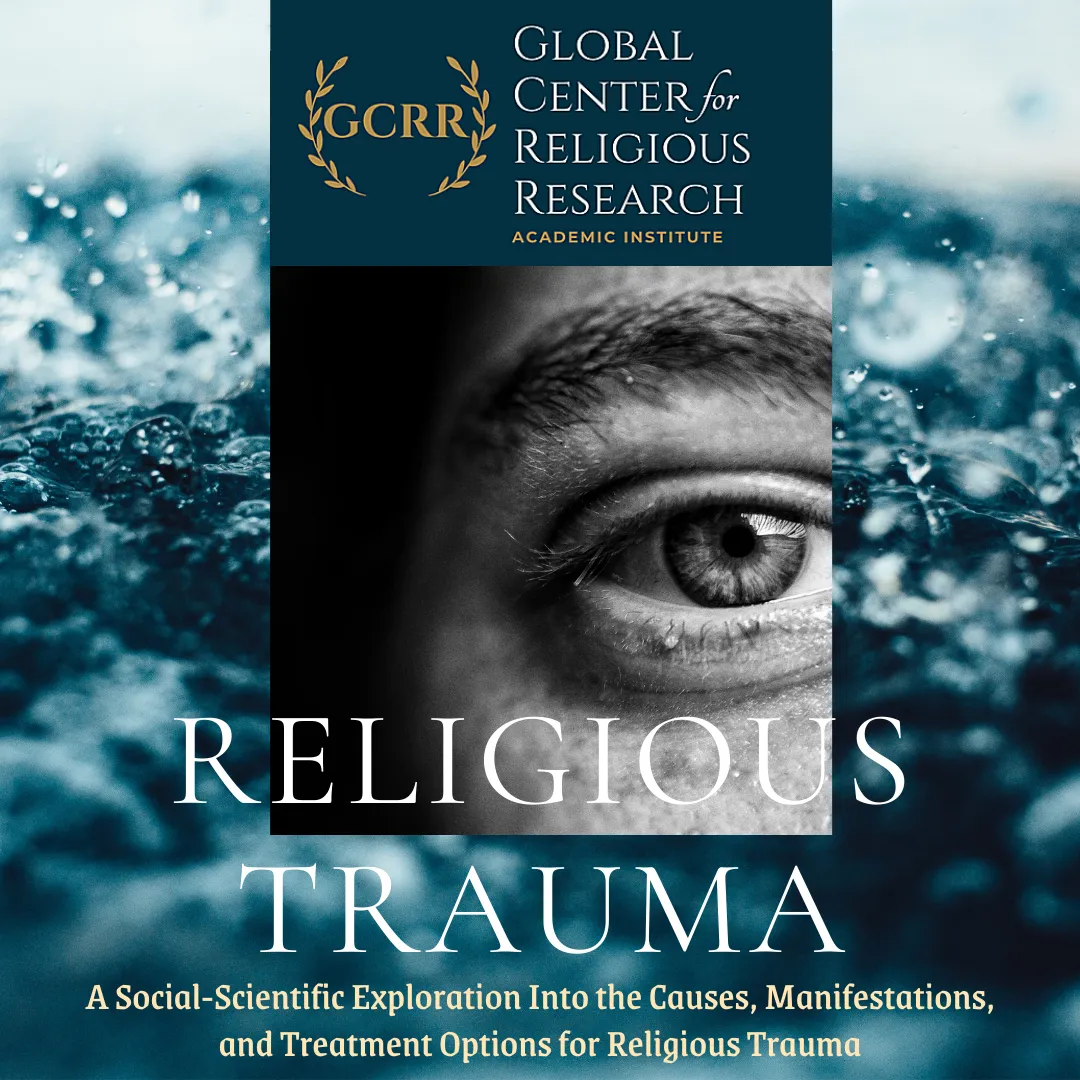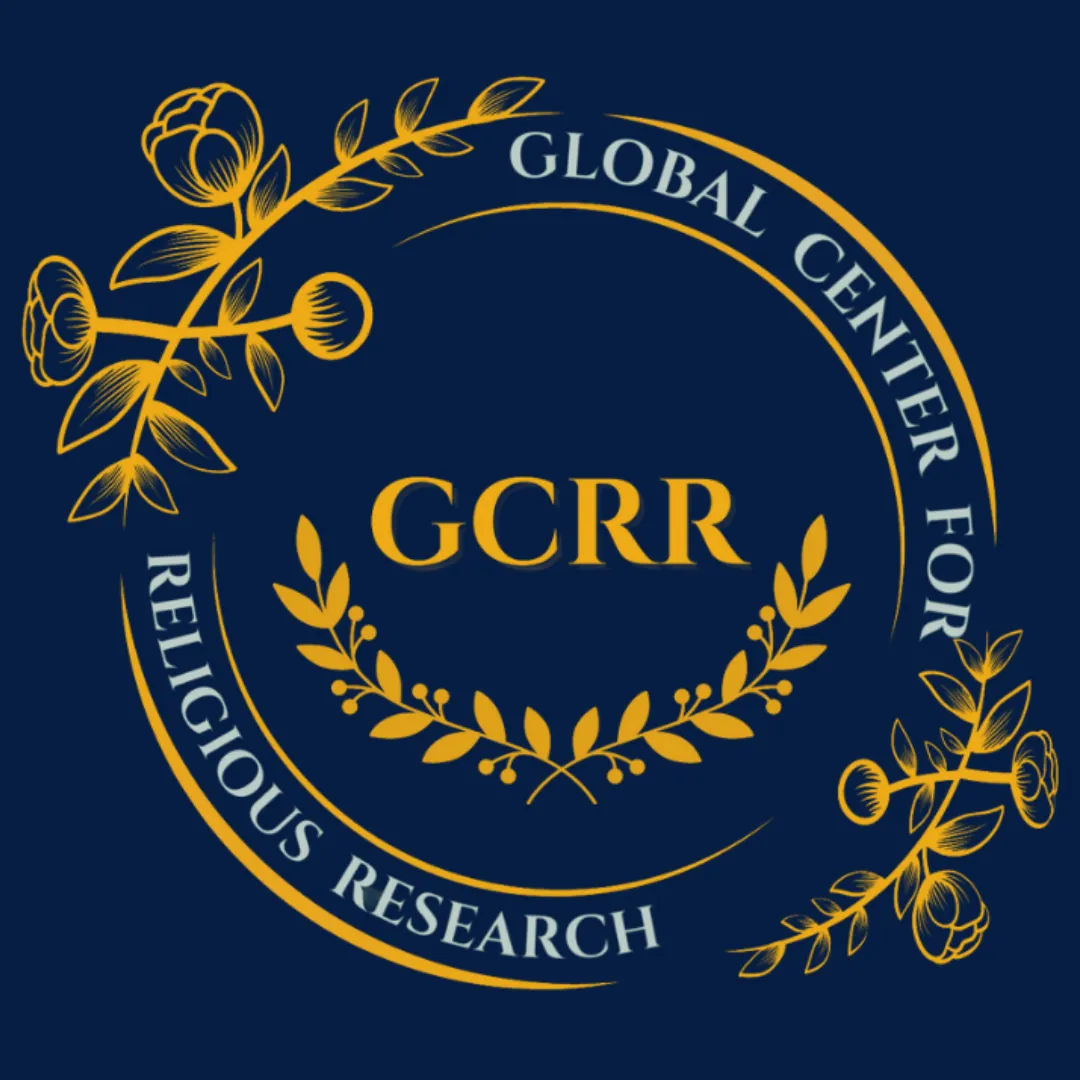
We use cookies to ensure that we give you the best experience on our website. If you continue to use this site, we assume you agree to our privacy policy and terms and conditions
We use cookies to ensure that we give you the best experience on our website. If you continue to use this site, we assume you agree to our privacy policy and terms and conditions
In the Name of the Father, the Son
& The Holy... TRAUMA.
The Global Center for Religious Research is proud to present a Certification Program in Religious Trauma Studies to help mental health specialists identify, diagnose and develop an effective treatment plan for the increasing number of clients they're encountering who are navigating the profound and often hidden effects of Religious Trauma.
Connecting the Dots - The missing link
As a clinician, tirelessly devoting your days to assisting clients nonstop, you may be feeling a little overwhelmed with the amount of (sometimes seemingly unrelated) issues and diverse symptoms your clients present every week.
It presents like anxiety.
It presents like depression.
It presents like PTSD.
But your regular therapeutic toolkit doesn't always work for them, and you’re not okay with that. Because you care.

In the Name of the Father, the Son
& The Holy... TRAUMA.
The Global Center for Religious Research is proud to present a Certification Program in Religious Trauma Studies to help mental health specialists identify, diagnose and develop an effective treatment plan for the increasing number of clients they're encountering who are navigating the profound and often hidden effects of Religious Trauma.
Connecting the Dots -
The missing link
As a clinician, tirelessly devoting your days to assisting clients nonstop, you may be feeling a little overwhelmed with the amount of (sometimes seemingly unrelated) issues and diverse symptoms your clients present every week.
It presents like anxiety.
It presents like depression.
It presents like PTSD.
But your regular therapeutic toolkit doesn't always work for them, and you’re not okay with that. Because you care.

Another client leaves a session and questions circle your mind like:
How am I going to help my client?
What can I do to bring some relief to their suffering?
How can I show this person understanding and compassion and safety?
How can I validate what they are experiencing so they don’t feel so broken?
What if all those different symptoms stem from their core exposure to toxic religious indoctrination?
The answer to all these questions lies in your ability to accurately recognize, diagnose, and develop an effective treatment plan for the very real TRAUMA that can come from RELIGION.


Contrary to popular belief, we now have scientific evidence that religious trauma exists and requires unique intervention.
As many as 1-in-3 adults in the United States have suffered from Religious Trauma at some point in their life, and as many as 1-in-5 currently suffer from multiple debilitating Religious Trauma symptoms on a daily basis.
Even though there are numerous positive aspects to religion, it’s evident that your clients' faith background and ingrained belief systems can also be a source of undetected mental health wounds that manifest in unexpected ways.

Religious Trauma,
Let Us Count The Ways.
Faith-Based Distress Can Look Like...
❧ Deep or chronic shame about being a sinner and not living up to expectations
❧ Feelings of unworthiness, being unlovable, or bad in some way
❧ Fear of rejection by God or the faith community including being publicly shamed, ostracized, guilt-tripped and demonized for any minor infraction
❧ Lack of self-compassion
❧ Lack of personal autonomy - an ingrained belief that one's life is for God's sole purpose, leading to challenges making decisions, creating personal boundaries and providing intentional consent
❧ Feeling that they can't trust themselves, their body or their emotions
❧ A Fixation on Purity Culture where individuals experience shame, guilt, and anxiety surrounding their sexuality, and feel pressured to conform to strict moral standards of abstinence and modesty.
❧ Growing up with chronic fear or anxiety around salvation, rapture, Hell, Satan, or demons
❧ Feeling personally responsible for Christ's death
❧ Superstitious beliefs about what will lead to positive and negative outcomes in life
❧ Perfectionism or hypervigilance - fear of making mistakes
❧ Extreme dualistic thinking - judging every individual thought and action as "good" or "bad"
❧ Spiritual bypassing - denying the presence and validity of mental health issues due to a belief that those feelings come from Satan or a lack of faith and if they just pray hard enough then God will take it away
❧ Difficulty with experiencing pleasure
❧ Feeling bad or wrong for having sexual thoughts or feelings, or having physical reactions to sexual situations such as crying or feeling a disconnection from the body
❧ Denying one's sexuality or gender identity
❧ Marginalizing or stigmatizing the LGBTQ+ community
❧ Lasting trauma from conversion therapy
❧ Religiously-based OCD, scrupulosity, or superstitious habits
❧ Deep or chronic shame about being a sinner and not living up to expectations
❧ Feelings of unworthiness, being unlovable, or bad in some way
❧ Fear of rejection by God or the faith community including being publicly shamed, ostracized, guilt-tripped and demonized for any minor infraction
❧ Lack of self-compassion
❧ Lack of personal autonomy - an ingrained belief that one's life is for God's sole purpose, leading to challenges making decisions, creating personal boundaries and providing intentional consent
❧ Feeling that they can't trust themselves, their body or their emotions
❧ A Fixation on Purity Culture where individuals experience shame, guilt, and anxiety surrounding their sexuality, and feel pressured to conform to strict moral standards of abstinence and modesty.
❧ Growing up with chronic fear or anxiety around salvation, rapture, Hell, Satan, or demons
❧ Feeling personally responsible for Christ's death
❧ Superstitious beliefs about what will lead to positive and negative outcomes in life
❧ Perfectionism or hypervigilance - fear of making mistakes
❧ Extreme dualistic thinking - judging every individual thought and action as "good" or "bad"
❧ Spiritual bypassing - denying the presence and validity of mental health issues due to a belief that those feelings come from Satan or a lack of faith and if they just pray hard enough then God will take it away
❧ Difficulty with experiencing pleasure
❧ Feeling bad or wrong for having sexual thoughts or feelings, or having physical reactions to sexual situations such as crying or feeling a disconnection from the body
❧ Denying one's sexuality or gender identity
❧ Marginalizing or stigmatizing the LGBTQ+ community
❧ Lasting trauma from conversion therapy
❧ Religiously-based OCD, scrupulosity, or superstitious habits

It's a lot. We know.
It’s likely that your clients have gone to multiple mental health professionals without getting the help they need.
The reason is that few clinicians are trained in religious trauma.
But once you see it, you can’t unsee it.
And now, we finally have the empirical evidence needed to support what clinicians, specialists, and sufferers alike have been saying for decades...
It’s likely that your clients have gone to multiple mental health professionals without getting the help they need.
The reason is that few clinicians are trained in religious trauma.
But once you see it, you can’t unsee it.
And now, we finally have the empirical evidence needed to support what clinicians, specialists, and sufferers alike have been saying for decades...
... that Religious Trauma is real and is, in fact, a chronic problem within far too many faith communities. And we need a valid solution.
... that Religious Trauma is real and is, in fact, a chronic problem within far too many faith communities. And we need a valid solution.
We're honored to provide that solution ⬇️⬇️⬇️

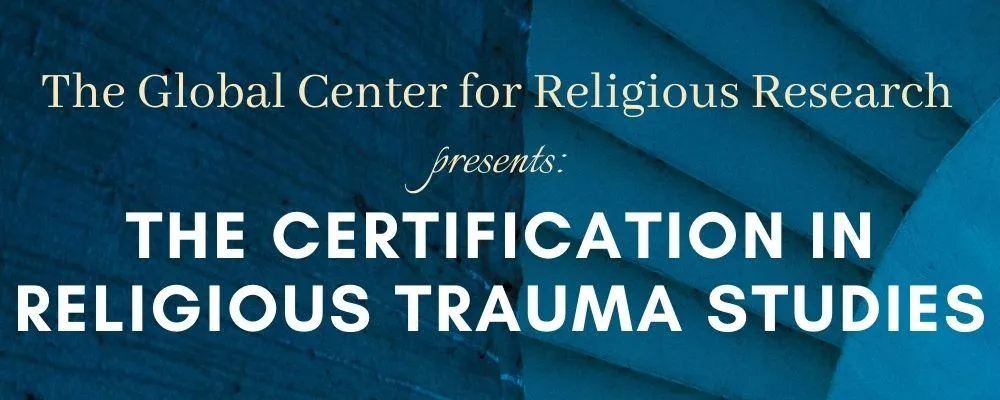
GCRR currently offers the ONLY affordable, accessible, and comprehensive Certification Course on this topic available to mental health professionals to boost their professional resume, credentials, and therapeutic offerings for clients.
Many of our students have been able to use the course to acquire CEUs* from their accrediting agency. We know how tough it can be to find accessible and affordable continuing education options that provide real relevance and value and we're proud to be able to offer that to mental health professionals.
*Please Note: we recommend checking with your accrediting agency for CEU approval.
GCRR currently offers the ONLY affordable, accessible, and comprehensive Certification Course on this topic available to mental health professionals to boost their professional resume, credentials, and therapeutic offerings for clients.
Many of our students have been able to use the course to acquire CEUs* from their accrediting agency. We know how tough it can be to find accessible and affordable continuing education options that provide real relevance and value and we're proud to be able to offer that to mental health professionals.
*Please Note: we recommend checking with your accrediting agency for CEU approval.
Our certification program is an online self-paced study program that helps you identify the symptoms of Religious Trauma, hear real accounts from sufferers and survivors, understand psychologically and physiologically what Religious Trauma does to the human brain and body, and discover the different religious contexts and beliefs that can create a trauma response.

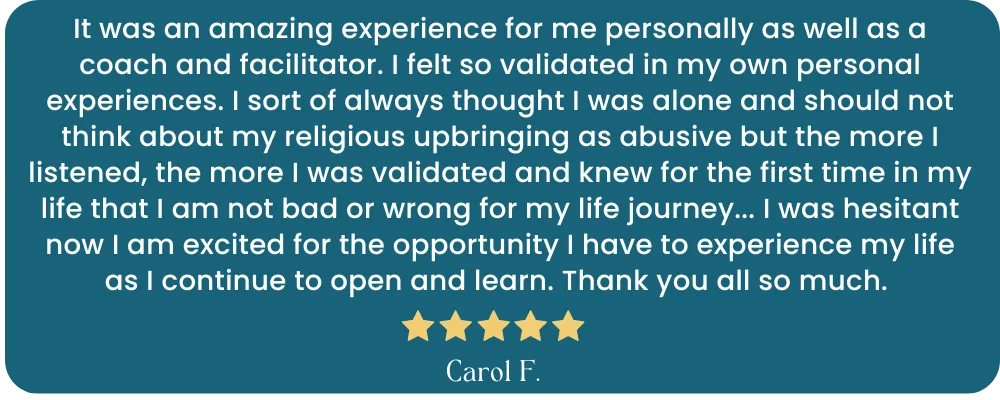
We've had hundreds of students successfully go through the self-paced virtual course including:
Mental Health Practitioners and Clinicians
Therapists and Counselors
Psychologists and Psychiatrists
Religious and Spiritual Leaders
Coaches and Healers
Students and Researchers
Sufferers themselves seeking to self-validate and heal
Mental Health Practitioners and Clinicians
Therapists and Counselors
Psychologists and Psychiatrists
Religious and Spiritual Leaders
Coaches and Healers
Students and Researchers
Sufferers themselves seeking to self-validate and heal

Become empowered through next-level, trauma-informed teachings
on this lesser known source of trauma so you can:
❧ Unpack the tangled webs of beliefs and religious doctrine that can lead to trauma responses in the brain and body.
❧ Identify the source of complex thoughts, feelings and behaviors by understanding how certain faith doctrines and belief systems can actually cause an ingrained trauma response loop in the nervous system.
❧Discover how to effectively rewire unique religious trauma triggers and responses with appropriate treatment.
❧ Validate the emotional and physical responses to triggers by recognizing the unique symptoms of Religious Trauma
❧ Accurately differentiate between generalized anxiety, depression, or PTSD and the trauma that comes as a result of toxic religion.
❧ Learn best practices for treating Religious Trauma including how to support your clients who may choose to remain in their faith tradition recognizing that treatment and faith do not have to be mutually exclusive and can compatibly contribute to an individual's healing journey.
❧ Understand that Religious Trauma can originate simply from the innate beliefs, practices, or structures within the religious institution itself and doesn’t always stem from a single event or abuser, though those also are valid sources of trauma as well.
THE FIRST STEP IS RECEIVING A CERTIFICATION IN RELIGIOUS TRAUMA STUDIES.

It’s about revolutionizing your therapeutic approach.
Acquiring your Certificate in Religious Trauma Studies will finally help you start the real healing process with your clients who are impacted by this all-too-common affliction.

Become empowered through next-level, trauma-informed teachings on this lesser known source of trauma so you can:
❧ Unpack the tangled webs of beliefs and religious doctrine that can lead to trauma responses in the brain and body.
❧ Identify the source of complex thoughts, feelings and behaviors by understanding how certain faith doctrines and belief systems can actually cause an ingrained trauma response loop in the nervous system.
❧Discover how to effectively rewire unique religious trauma triggers and responses with appropriate treatment.
❧ Validate the emotional and physical responses to triggers by recognizing the unique symptoms of Religious Trauma
❧ Accurately differentiate between generalized anxiety, depression, or PTSD and the trauma that comes as a result of toxic religion.
❧ Learn best practices for treating Religious Trauma including how to support your clients who may choose to remain in their faith tradition recognizing that treatment and faith do not have to be mutually exclusive and can compatibly contribute to an individual's healing journey.
❧ Understand that Religious Trauma can originate simply from the innate beliefs, practices, or structures within the religious institution itself and doesn’t always stem from a single event or abuser, though those also are valid sources of trauma as well.
THE FIRST STEP IS RECEIVING A CERTIFICATION IN RELIGIOUS TRAUMA STUDIES.


It’s about revolutionizing your therapeutic approach.
Acquiring your Certificate in Religious Trauma Studies will finally help you start the real healing process with your clients who are impacted by this all-too-common affliction.
GCRR's work on Religious Trauma has been featured on:



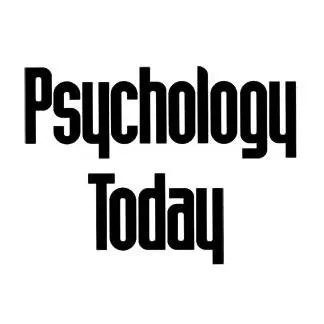





Reverse Religious Trauma’s Damaging Effects
With people around the world actively (and often unknowingly) experiencing the disruptive effects of Religious Trauma every day, proper recognition and effective mental health support must be the focus of treating and reversing its damaging effects.
As specialists, it is crucial for us to identify the symptoms of religious trauma, have a deep understanding of its effects on the human brain and body, be knowledgeable about the various contexts that can lead to religious trauma, and be skilled in determining the most effective methods for treating it.
And we can help you do that.
Start your Certification in Religious Trauma Studies today.
Reverse Religious Trauma’s
Damaging Effects
With people around the world actively (and often unknowingly) experiencing the disruptive effects of Religious Trauma every day, proper recognition and effective mental health support must be the focus of treating and reversing its damaging effects.
As specialists, it is crucial for us to identify the symptoms of religious trauma, have a deep understanding of its effects on the human brain and body, be knowledgeable about the various contexts that can lead to religious trauma, and be skilled in determining the most effective methods for treating it.
And we can help you do that.
Start your Certification in Religious Trauma Studies today.
Imagine...

Working with a client who presents with religious trauma, recognizing their religious triggers, and then diagnosing them accurately.
Seamlessly moving them into an effective treatment plan that reverses the damages caused and provides them with powerful tools to navigate the path forward.
Supporting your client as they find the delicate balance between remaining in their faith tradition (if they so choose) and creating healthy boundaries to protect their mental health and wellbeing.
Becoming an expert in Religious Trauma is life changing.
For your practice.
For your clients.
And it also creates a powerful personal journey of growth and self-discovery for yourself.
With our Religious Trauma certification course, you will be equipped with an arsenal of knowledge and tools that you can immediately implement to improve your practice and provide the real care your subjects need.
Becoming an expert in Religious Trauma is life changing.
For your practice.
For your clients.
And it also creates a powerful personal journey of growth and self-discovery for yourself.
With our Religious Trauma certification course, you will be equipped with an arsenal of knowledge and tools that you can immediately implement to improve your practice and provide the real care your subjects need.

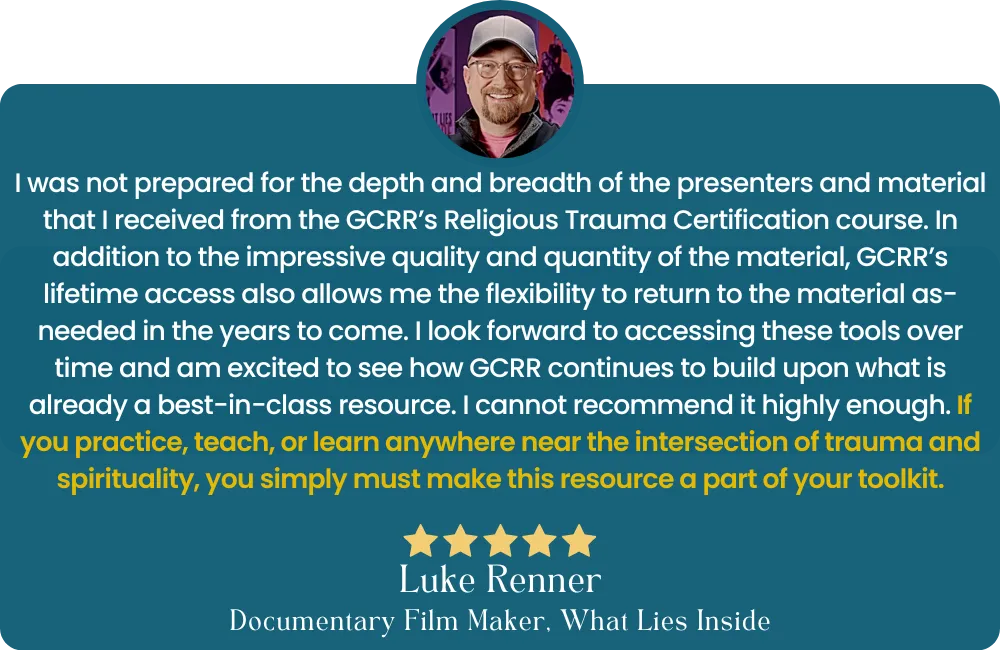
Real Healing. Real Results
What You Get -
32+ hours of on-demand scholarly and evidence-based video content from prestigious world leaders to advance your clinical and psychological understandings of Religious Trauma
All presentations provide accurate, ethical, and clinically-sound information that have the best interests of potential sufferers in mind (whether they seek to remain in their faith tradition or confidently navigate their exit)
An extensive vault of additional articles, assessment and diagnostic tools, research papers, and other resources
Access to our private Facebook Group where you can discuss your studies and stories with other practitioners
An Official GCRR Certificate of Completion that can be added as a qualified credential on your CV
Use your certificate to apply for CEUs* (at a fraction of the cost that comes with other workshops or University-level courses)
*While many students have successfully submitted their certificate for CEUs, GCRR recommends checking with your accrediting agency for CEU approval.
How The Certification Works -
Watch the videos. Anywhere. Anytime. You get lifetime access to the content and there are no deadlines for completion
Once you’ve completed your studies, you will receive an official GCRR Certificate of Completion
Check with your accrediting agency to see if your GCRR certificate can be used toward CEUs
Add Religious Trauma Studies to your area of expertise and list of theraputic offerings.
Revolutize the way you help your clients
Take a Peek At What You'll Learn -
We reached out to top experts in the field including specialists, scholars, educators, psychologists, therapists, researchers, professors, and ministers, and invited them to come together to present their research, knowledge, and experiences.
Here’s a small sample of some of the topics covered within the course >>>>
“How Religious Trauma Affects The Nervous System and Body” by Elizabeth Wilson, LPC, LAC (Clinical Trauma Specialist)
“A Twisting of the Sacred” by Paula Swindle (PhD, LCMHCS, Specialist in Religious Abuse and Harmful Theology) and Craig Cashwell (PhD, Professor, School of Psychology and Counselor Education at William & Mary)
“Power and Control Dynamics of Growing Up In An Abrahamic Faith Environment” by Gill Harvey, DPsych (Therapeutic Counselor and Researcher)
“Religious Abuse and the Trauma of Perceived Spiritual Failure” by Janyne McConnaughey, PhD (Nationally Recognized Trauma-Informed Author and Advocate)
“Faith, Doubt, and Gatekeeper Trauma” by Brian D. McLaren, MA (Author, Activist and Public Theologian)
“Bereavement and Bad Theology” by Teri Daniel, DMin, CT, CCTP (Inter-spiritual Hospice Chaplain, Grief Counselor and Adjunct Instructor)
“Religious Shame, Self-Criticism, and Mitigating Effects of Self-Compassion” by Mark Karris, LMFT, PsyD (Adjunct Professor; Licensed Therapist)
“The Effectiveness of Using EMDR in Trauma Treatment” by Arielle Sokoll Ward, VCSW (EMDR Trauma Therapist)
“Entheogenic Therapies for Religious Trauma and Disaffiliation: A Phenomenological Argument” by Kelby Bibler (Grad Student, Boston College)
“Gay the Pray Away” by Rev. Erika Allison (Interfaith & LGBTQIA+ Minister and Conversion Therapy Survivor)
“Exploring Clergy’s Attitudes about Mental Health in the African American Church” by Vanessa Brooks, MA (mental health professional)
“Religious Trauma and the Later in Life LGBTQIA+ Community” by Anne-Marie Zanzal, MDiv (Coming Out Coach, Storyteller and Author)
“Religion-Induced Transient Childhood OCD: Two Case Studies” by Urte Laukaityte, M.Sc. (PhD Candidate, UC Berkeley)
“Departing a Religion: Supporting Those in Grief” by Kara Bowman, MFT (Certified Grief Counselor, Certified Thanatologist, Certified Trauma Therapist)
“Chewed Up Gum and Broken Rose Petals: Problematizing Purity Culture in Evangelical Christianity” by Katelynn Steinhauser (Graduate Student in English Writing and Rhetoric, Texas Woman's University)
“How Religious Trauma Hits Home” by Rebekah Drumsta, MA, CPLC (Spiritual Abuse Advocate, Author, Consultant, Coach)
“The Effect of Adverse Religious Experiences on Women’s Health: A Proposed Grounded Theory Study within the Theoretical Framework of the Roy Adaptation Model” by Beth Schwartz, MS (Professor of Nursing, UCLA)
“Understanding Religious Trauma through the Internal Family Systems Model” by Jenna Riemersma, LPC, CSAT-S, CMAT-S, NCC (#1 Best-Selling Author and Founder/Clinical Director of the Atlanta Center for Relational Healing)
“Black Religious Trauma: A Pan-Africanist Lens Into Abrahamism & Brahmism, and The Existential Identity Spiritual Healing” by César Ndéma-Moussa (Eastern Ontario Regional Director of Equity, Diversity and Inclusivity in Child Welfare)
All That PLUS SO MUCH MORE >>> Just $299 <<<
(3-Month Payment Plan also available)

Real Healing. Real Results
What You Get -
32+ hours of on-demand scholarly and evidence-based video content from prestigious world leaders to advance your clinical and psychological understandings of Religious Trauma
All presentations provide accurate, ethical, and clinically-sound information that have the best interests of potential sufferers in mind (whether they seek to remain in their faith tradition or confidently navigate their exit)
An extensive vault of additional articles, assessment and diagnostic tools, research papers, and other resources
Access to our private Facebook Group where you can discuss your studies and stories with other practitioners
An Official GCRR Certificate of Completion that can be added as a qualified credential on your CV
Use your certificate to apply for CEUs* (at a fraction of the cost that comes with other workshops or University-level courses)
*While many students have successfully submitted their certificate for CEUs, GCRR recommends checking with your accrediting agency for CEU approval.
How The Certification Works -
Watch the videos. Anywhere. Anytime. You get lifetime access to the content and there are no deadlines for completion
Once you’ve completed your studies, you will receive an official GCRR Certificate of Completion
Check with your accrediting agency to see if your GCRR certificate can be used toward CEUs*
Add Religious Trauma Studies to your area of expertise and list of theraputic offerings.
Revolutize the way you help your clients
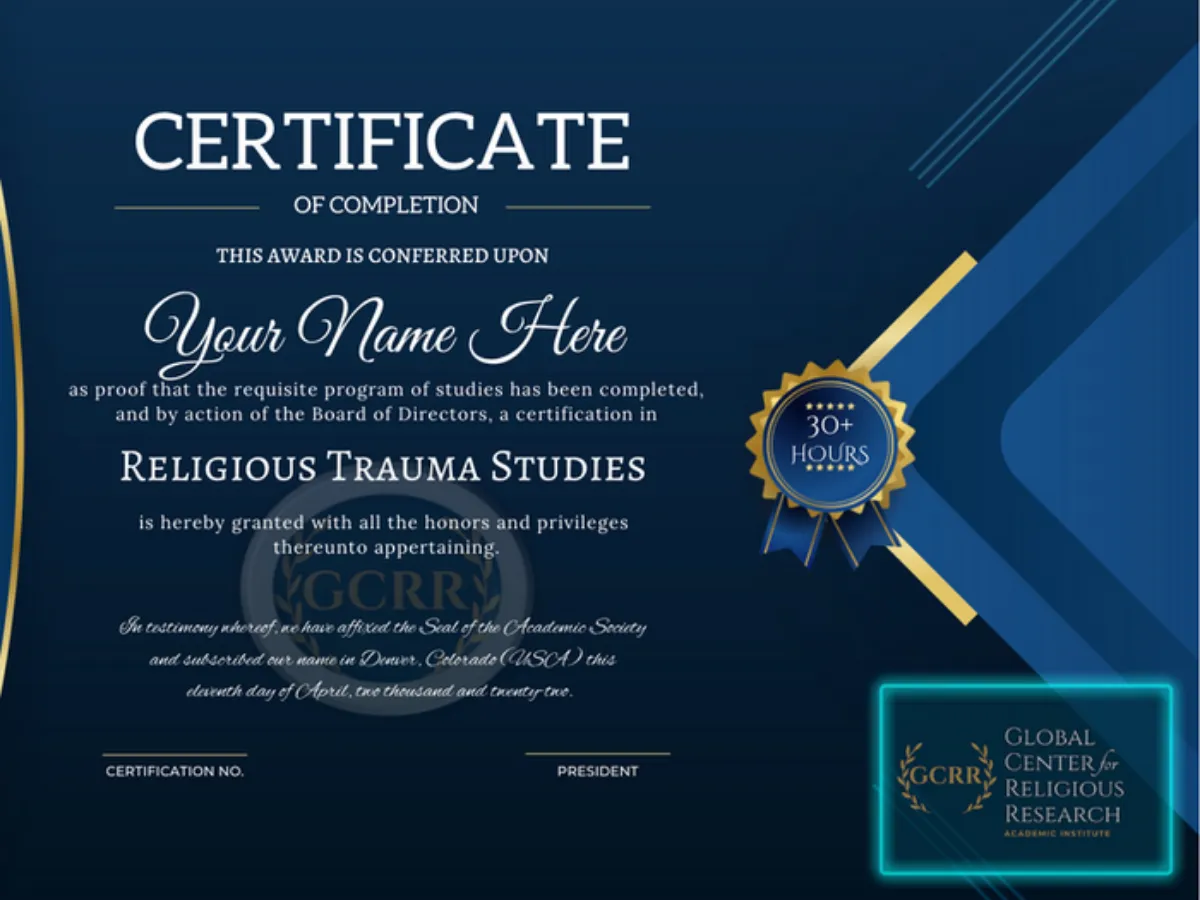
Take a Peek At What You'll Learn -
We reached out to top experts in the field including specialists, scholars, educators, psychologists, therapists, researchers, professors, and ministers, and invited them to come together to present their research, knowledge, and experiences.
Here’s a small sample of some of the topics covered within the course >>>>
“How Religious Trauma Affects The Nervous System and Body” by Elizabeth Wilson, LPC, LAC (Clinical Trauma Specialist)
“A Twisting of the Sacred” by Paula Swindle (PhD, LCMHCS, Specialist in Religious Abuse and Harmful Theology) and Craig Cashwell (PhD, Professor, School of Psychology and Counselor Education at William & Mary)
“Power and Control Dynamics of Growing Up In An Abrahamic Faith Environment” by Gill Harvey, DPsych (Therapeutic Counselor and Researcher)
“Religious Abuse and the Trauma of Perceived Spiritual Failure” by Janyne McConnaughey, PhD (Nationally Recognized Trauma-Informed Author and Advocate)
“Faith, Doubt, and Gatekeeper Trauma” by Brian D. McLaren, MA (Author, Activist and Public Theologian)
“Bereavement and Bad Theology” by Teri Daniel, DMin, CT, CCTP (Inter-spiritual Hospice Chaplain, Grief Counselor and Adjunct Instructor)
“Religious Shame, Self-Criticism, and Mitigating Effects of Self-Compassion” by Mark Karris, LMFT, PsyD (Adjunct Professor; Licensed Therapist)
“The Effectiveness of Using EMDR in Trauma Treatment” by Arielle Sokoll Ward, VCSW (EMDR Trauma Therapist)
“Entheogenic Therapies for Religious Trauma and Disaffiliation: A Phenomenological Argument” by Kelby Bibler (Grad Student, Boston College)
“Gay the Pray Away” by Rev. Erika Allison (Interfaith & LGBTQIA+ Minister and Conversion Therapy Survivor)
“Exploring Clergy’s Attitudes about Mental Health in the African American Church” by Vanessa Brooks, MA (mental health professional)
“Religious Trauma and the Later in Life LGBTQIA+ Community” by Anne-Marie Zanzal, MDiv (Coming Out Coach, Storyteller and Author)
“Religion-Induced Transient Childhood OCD: Two Case Studies” by Urte Laukaityte, M.Sc. (PhD Candidate, UC Berkeley)
“Departing a Religion: Supporting Those in Grief” by Kara Bowman, MFT (Certified Grief Counselor, Certified Thanatologist, Certified Trauma Therapist)
“Chewed Up Gum and Broken Rose Petals: Problematizing Purity Culture in Evangelical Christianity” by Katelynn Steinhauser (Graduate Student in English Writing and Rhetoric, Texas Woman's University)
“How Religious Trauma Hits Home” by Rebekah Drumsta, MA, CPLC (Spiritual Abuse Advocate, Author, Consultant, Coach)
“The Effect of Adverse Religious Experiences on Women’s Health: A Proposed Grounded Theory Study within the Theoretical Framework of the Roy Adaptation Model” by Beth Schwartz, MS (Professor of Nursing, UCLA)
“Understanding Religious Trauma through the Internal Family Systems Model” by Jenna Riemersma, LPC, CSAT-S, CMAT-S, NCC (#1 Best-Selling Author and Founder/Clinical Director of the Atlanta Center for Relational Healing)
“Black Religious Trauma: A Pan-Africanist Lens Into Abrahamism & Brahmism, and The Existential Identity Spiritual Healing” by César Ndéma-Moussa (Eastern Ontario Regional Director of Equity, Diversity and Inclusivity in Child Welfare)
All That PLUS SO MUCH MORE >>> Just $299
(3-Month Payment Plans Also Available!)

Hello,
I'm Dr. Darren Slade
Founder and President of
The Global Center for Religious Research

I went through five mental health professionals before finally finding one who was educated on the causes, manifestations and treatment options for Religious Trauma. When I first heard of Religious Trauma, I imagined extreme situations like physical violation or radical cult indoctrination.
But I soon came to realize that it very closely described my experience, and it explained the numerous trauma responses I carry with me, including chronic mental health issues and physical health issues related to an overwhelmed nervous system.
I always regarded my faith as very positive - I felt loved, secure and safe. It was a source of strength in my life, but what my therapist helped me realize is that my crippling emotional and mental health challenges actually stemmed from my own seemingly innocent faith upbringing and the religious teachings of my faith that had taken a foothold deep in my psyche and created a toxic environment of fear and shame.
Unfortunately, this is an all too common story. Too often victims of toxic religion suffer in silence for years before encountering a trauma-informed therapist who is able to correctly identify and break down the walls of what’s really disrupting their daily life.
The good news is that by understanding Religious Trauma from a clinical perspective, you can help people explain their body's physical and emotional responses to growing up with certain theological doctrines and religious experiences that have created a trauma response loop in their nervous system.
And once validated, they can finally begin a healing journey recognizing that:
💡They’re not sinful, they’re traumatized.
💡They’re not unworthy, they’re beautifully human and are just trapped in a trauma cycle that rests deep in the synapses of their nervous system.
💡They are not broken, they are responding instinctively out of an innate survival mechanism.
💡They do not need to leave their faith identity if they do not wish to, but they do need to rewire some thought patterns and create healthy boundaries to protect their own mind
Tangible Healing and Freedom from Religious Trauma.
Hello,
I'm Dr. Darren Slade
Founder and President of
The Global Center for Religious Research

I went through five mental health professionals before finally finding one who was educated on the causes, manifestations and treatment options for Religious Trauma. When I first heard of Religious Trauma, I imagined extreme situations like physical violation or radical cult indoctrination.
But I soon came to realize that it very closely described my experience, and it explained the numerous trauma responses I carry with me, including chronic mental health issues and physical health issues related to an overwhelmed nervous system.
I always regarded my faith as very positive - I felt loved, secure and safe. It was a source of strength in my life, but what my therapist helped me realize is that my crippling emotional and mental health challenges actually stemmed from my own seemingly innocent faith upbringing and the religious teachings of my faith that had taken a foothold deep in my psyche and created a toxic environment of fear and shame.
Unfortunately, this is an all too common story. Too often victims of toxic religion suffer in silence for years before encountering a trauma-informed therapist who is able to correctly identify and break down the walls of what’s really disrupting their daily life.
The good news is that by understanding Religious Trauma from a clinical perspective, you can help people explain their body's physical and emotional responses to growing up with certain theological doctrines and religious experiences that have created a trauma response loop in their nervous system.
And once validated, they can finally begin a healing journey recognizing that:
💡They’re not sinful, they’re traumatized.
💡They’re not unworthy, they’re beautifully human and are just trapped in a trauma cycle that rests deep in the synapses of their nervous system.
💡They are not broken, they are responding instinctively out of an innate survival mechanism.
💡They do not need to leave their faith identity if they do not wish to, but they do need to rewire some thought patterns and create healthy boundaries to protect their own mind
Tangible Healing and Freedom from Religious Trauma.
FAQs - In Case You're Wondering...
FAQs - In Case You're Wondering...
Do I have to attend any classes?
No. Enjoy a self-paced, on-demand interactive learning environment that works with your busy schedule. Listen to lessons between clients. On your commute. Or with a coffee in hand.
How do I get my CEUs*?
Upon completion of the course you will receive an official GCRR certificate of completion for 32+ hours that you can submit to apply for CEUs (please note: the exact number of qualified CEUs that will be granted is variable and cannot be guaranteed, this depends on your agency's requirements).
For places like ASWB, Evergreen/Pesi, and state boards, we recommend doing the following: 1) Contact your certification agency directly and inquire about obtaining approval for CEUs on our Religious Trauma course. Let them know that the course has already been approved for other members in the past. 2) Let them know that the Religious Trauma course has 32+ hours of content, which has been approved in the past by places like Evergreen and state chapters of the National Association of Social Workers for a 3-year renewal (or a total of 18 CEUs). 3) If they ask for an outline and list of objectives for the course, you can copy and paste the information found at the very bottom of this page.
In addition, you can add Religious Trauma Studies to your credentials, on your resume or CV and list of offerings for existing and prospective clients.
How long do I have to complete the certification?
As long as you need. You have lifetime access to the content. When you’ve completed the course material, you’ll be able to apply for CEUs with your certificate.
What if I’m not a working professional but I’m interested to learn about religious trauma for myself?
We got you. You are welcome to enroll in the certification course as a self-directed knowledge seeker for our full collection of content on Religious Trauma to date, or you can opt to access our introductory video library on the topic for just $49. Click here >>
What’s the difference between the introductory video library and the Certification?
With the introductory library you will gain access to 18 videos from esteemed presenters discussing the topic of Religious Trauma to enhance your own understanding. You’ll loose access to the Facebook community, additional presentations, resources, articles, and worksheets from the presenters, and your ability to gain 30+ hours of CEUs. Click here to access the library for $49 >>
Who are the Presenters?
We reached out to top experts in the field including: specialists, scholars, educators, psychologists, therapists researchers, professors, ministers and spiritual leaders and invited them to come together to present their research, knowledge and experiences and contribute to a comprehensive forum about the causes, manifestations and treatment options for those afflicted by and suffering from undiagnosed or unrecognized adverse effects associated with religious indoctrination and abuse.
Many people don't realize that though there are numerous positive aspects of religion, their faith background and belief systems can also be a source of undetected mental health wounds that manifest in unexpected ways.
In order for victims of Religious Trauma to receive the help they need, we must arrive at a place in our culture where Religious Trauma is accepted as a real condition, not just a subset of PTSD or other anxiety disorder.
We must recognize that even though there are many prosocial aspects of religious belief, certain religious contexts have also been responsible for a number of traumatic experiences and detrimental ideologies for people around the globe and across time.
In order for victims of Religious Trauma to receive the help they need, we must arrive at a place in our culture where Religious Trauma is accepted as a real condition, not just a subset of PTSD or other anxiety disorder.
We must recognize that even though there are many prosocial aspects of religious belief, certain religious contexts have also been responsible for a number of traumatic experiences and detrimental ideologies for people around the globe and across time.


Despite the longevity of this real issue, Religious Trauma research is in its infancy compared to other studies in mental health. Knowledge and awareness is limited.
What we do know is that Religious Trauma exists and is a chronic problem impacting hundreds of thousands of people worldwide, but they go on suffering without the clinical understanding and support needed to find a way forward out of the confusion and darkness.
Despite the longevity of this real issue, Religious Trauma research is in its infancy compared to other studies in mental health. Knowledge and awareness is limited.
What we do know is that Religious Trauma exists and is a chronic problem impacting hundreds of thousands of people worldwide, but they go on suffering without the clinical understanding and support needed to find a way forward out of the confusion and darkness.
At The Global Center for Religious Research we decided we needed to do something about this void of awareness and insight. We recognized the need to provide mental health professionals, as well as religious leaders and victims themselves, with scientifically-derived, factual data in order to begin work on understanding and then treating Religious Trauma.

Its time to pull back the curtain and discover the under-recognized truth about how religious doctrine can lead to trauma responses in the brain and body.
The complexities of the term “trauma” is often misunderstood by even therapeutic practitioners, particularly when addressing prolonged exposure to systemic institutional abuse.
This is why GCRR established the North American Committee on Religious Trauma Research (NACRTR), consisting of some of the nation’s leading experts on religion and trauma, in order to provide the psychiatric community with a more precise and clinically-valid definition of “religious trauma.”
The official definition is as follows:

You’ve had clients who you’ve found to be mentally and emotionally injured by their deeply held religious beliefs but navigating the boundaries of facilitating the support they need while respecting where they are in their spiritual journey and their potential on-going need or desire to remain in their church community has proven challenging.
With GCRR's Religious Trauma Studies certification course, you can become equipped with an arsenal of knowledge and tools that you can immediately implement to improve your practice and provide the real care your subjects need.
You will also have continuous access to all the material as well as additional content, as we acquire it, to stay up-to-date on new developments in the field.
Upon successfully completing our program, you will receive an official GCRR Certification in Religious Trauma Studies for 32+ hours of content that you may use to apply for CEUs** and add as a credential on your resume or CV.
This certificate signifies your comprehensive understanding of Religious Trauma, its profound effects on individuals, and the diverse contexts in which it can occur. Armed with this specialized knowledge and insight, you will be well-equipped to address Religious Trauma in your practice and provide meaningful support to those in your sphere of influence who are impacted by it.
In addition you can add Religious Trauma to your list of offerings for existing and prospective clients.
*Please Note: we recommend checking with your accrediting agency for CEU approval.

Its time to pull back the curtain and discover the under-recognized truth about how religious doctrine can lead to trauma responses in the brain and body.
The complexities of the term “trauma” is often misunderstood by even therapeutic practitioners, particularly when addressing prolonged exposure to systemic institutional abuse.
This is why GCRR established the North American Committee on Religious Trauma Research (NACRTR), consisting of some of the nation’s leading experts on religion and trauma, in order to provide the psychiatric community with a more precise and clinically-valid definition of “religious trauma.”
The official definition is as follows:

You’ve had clients who you’ve found to be mentally and emotionally injured by their deeply held religious beliefs but navigating the boundaries of facilitating the support they need while respecting where they are in their spiritual journey and their potential on-going need or desire to remain in their church community has proven challenging.
With GCRR's Religious Trauma Studies certification course, you can become equipped with an arsenal of knowledge and tools that you can immediately implement to improve your practice and provide the real care your subjects need.
You will also have continuous access to all the material as well as additional content, as we acquire it, to stay up-to-date on new developments in the field.
Upon successfully completing our program, you will receive an official GCRR Certification in Religious Trauma Studies for 32+ hours of content that you may use to apply for CEUs** and add as a credential on your resume or CV.
This certificate signifies your comprehensive understanding of Religious Trauma, its profound effects on individuals, and the diverse contexts in which it can occur. Armed with this specialized knowledge and insight, you will be well-equipped to address Religious Trauma in your practice and provide meaningful support to those in your sphere of influence who are impacted by it.
In addition you can add Religious Trauma to your list of offerings for existing and prospective clients.
*Please Note: we recommend checking with your accrediting agency for CEU approval.

We are the Global Center for Religious Research
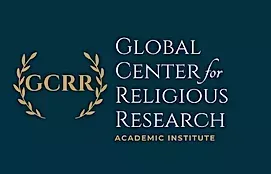
GCRR is the Global Leader in clinical and scientific Religious Trauma Research
GCRR’s main goal is the promotion of academic studies on religion, as well as the formation and preservation of professional standards in religious research, the distribution of affordable educational programs, and the support of religious researchers around the globe.
GCRR believes that academic resources and publications ought to be scholarly and evidence-based. This means presenting accurate, ethical, and clinically-sound information that has the best interests of potential sufferers in mind.
GCRR’s main goal is the promotion of academic studies on religion, as well as the formation and preservation of professional standards in religious research, the distribution of affordable educational programs, and the support of religious researchers around the globe.
GCRR believes that academic resources and publications ought to be scholarly and evidence-based. This means presenting accurate, ethical, and clinically-sound information that has the best interests of potential sufferers in mind.
As a social-scientific society, our students and scholars are devoted to the scientific, philosophical, and historical study of humanity’s various religious belief systems. We engage in an interdisciplinary and cross-cultural study of what people believe, how those beliefs have evolved over time, and why they continue to affect global systems today.
We neither promote nor denounce affiliation or practice within any religion but rather prioritize the specific needs of the sufferers over the needs of any one ideology or agenda.
As a social-scientific society, our students and scholars are devoted to the scientific, philosophical, and historical study of humanity’s various religious belief systems. We engage in an interdisciplinary and cross-cultural study of what people believe, how those beliefs have evolved over time, and why they continue to affect global systems today.
We neither promote nor denounce affiliation or practice within any religion but rather prioritize the specific needs of the sufferers over the needs of any one ideology or agenda.
GCRR is adamantly not profit-driven or agenda-driven.
We are education-driven.
Both our motivation and passion is focused on knowledge. As such, GCRR is neither religious nor confessional in its pursuit of that knowledge.
As an international organization, our membership consists of people from all over the world who seek the intellectual freedom to question and explore every aspect of religion itself, including its origins and manifestations.
GCRR is adamantly not profit-driven or agenda-driven.
We are education-driven.
Both our motivation and passion is focused on knowledge. As such, GCRR is neither religious nor confessional in its pursuit of that knowledge.
As an international organization, our membership consists of people from all over the world who seek the intellectual freedom to question and explore every aspect of religion itself, including its origins and manifestations.


Below is the complete list of the topics and objectives covered in GCRR’s Religious Trauma Certification Program
1) “How Religious Trauma Affects The Nervous System and Body” by Elizabeth Wilson, LPC, LAC (Clinical Trauma Specialist)
a. Knowledge: define and describe "trauma" as distinct from other issues.
b. Comprehension: recognize and predict the disruptive effects of trauma on the brain and body.
2) “A Twisting of the Sacred” by Paula Swindle (PhD, LCMHCS, Specialist in Religious Abuse and Harmful Theology) and Craig Cashwell (PhD, Professor, School of Psychology and Counselor Education at William & Mary)
a. Application: demonstrate and prepare clinicians for proper therapy practices when treating religious trauma sufferers.
b. Synthesis: devise and formulate treatment plans for patients struggling with religious trauma.
3) “Power and Control Dynamics of Growing Up In An Abrahamic Faith Environment” by Gill Harvey, DPsych (Theraputic Counselor and Researcher)
a. Comprehension: identify and classify early childhood environmental conditions that can result in religious trauma.
b. Analysis: compare and contrast healthy childhood development with those growing up in a strict religious environment.
4) “Religious Abuse and the Trauma of Perceived Spiritual Failure” by Janyne McConnaughey, PhD - Nationally Recognized Trauma-Informed Author and Advocate
a. Knowledge: outline and name the different ways that religious contexts could cause grief, shame, and fear in people.
b. Evaluation: assess and discriminate between nominal doctrinal teachings and abusive indoctrination practices.
5) “Faith, Doubt, and Gatekeeper Trauma” by Brian D. McLaren, MA (Author, Activist and Public Theologian)
a. Application: illustrate and solve the problem of inflexible belief systems.
b. Synthesis: rearrange and reorganize ministry to overcome elements of rigidity.
6) “Developmental Religious Trauma in the Familial Setting: Imagination or Experience?” by Gill Harvey, DPsych (Theraputic Counselor & Researcher)
a. Analysis: examine and subdivide spiritual abuse beliefs and practices.
b. Evaluation: interpret and support victims of childhood indoctrination.
7) “Bereavement and Bad Theology” by Teri Daniel, DMin, CT, CCTP (Inter-spiritual Hospice Chaplain, Grief Counselor and Adjunct Instructor)
a. Comprehension: identify and explain healthy grieving and coping mechanisms.
b. Application: illustrate and sketch proper clinical methods for addressing complicated grief brought on by religious beliefs.
8) “Religious Shame, Self-Criticism, and Mitigating Effects of Self-Compassion” by Mark Karris, LMFT, PsyD (Adjunct Professor; Licensed Therapist)
a. Analysis: examine and question the efficacy of spiritual disciplines for coping with shame and abuse.
b. Evaluation: defend and argue for adjustments to spiritual practices to incorporate self-compassion and other wellness strategies.
9) “The Effectiveness of Using EMDR in Trauma Treatment” by Arielle Sokoll Ward, VCSW (EMDR Trauma Therapist)
a. Knowledge: define and describe EMDR as a leading treatment option for PTSD and C-PTSD.
b. Comprehension: describe and translate EMDR methods for clinicians working specifically with religious trauma sufferers.
10) “Entheogenic Therapies for Religious Trauma and Disaffiliation: A Phenomenological Argument” by Kelby Bibler (Grad Student, Boston College)
a. Knowledge: label and list different entheogenic substances.
b. Evaluation: summarize and compare entheogenic substances to other treatment options for trauma survivors.
11) “What's the Harm: A Glimpse of My Life After Catholicism?” by Jenna Belk, host of Atheistasis Podcast
a. Application: dramatize and illustrate the effects of living in a high-demand religious context.
b. Synthesis: relate and prepare clinicians for the kinds of experiences and symptoms that patients may present with in session.
12) “Gay the Pray Away” by Rev. Erika Allison (Interfaith & LGBTQIA+ Minister and Conversion Therapy Survivor)
a. Comprehension: locate and discuss the various trauma symptoms related to gay conversion therapies.
b. Synthesis: design and assemble supportive communities to counter the negative consequences of gay conversion therapies.
13) “Exploring Clergy’s Attitudes about Mental Health in the African American Church” by Vanessa Brooks, MA (mental health professional)
a. Comprehension: Give examples and relate the discussion of religious trauma specifically to the American black community.
b. Evaluation: defend and justify the need for greater public transparency about religious trauma within the black community.
14) “The Sacredness of Trauma: Equipping Congregations to Bear Witness” by Elizabeth Power, MEd (International Best-Selling Author and Expert in Trauma-Responsive Systems)
a. Analysis: appraise and breakdown traditional ministerial approaches to addressing trauma symptoms among congregants.
b. Application: modify and show different processes for ministries to welcome and support trauma sufferers.
15) “Healing Hell Trauma: Psychological Treatment for Religious Indoctrination in Fear of Hell” by Andrew Jasko, MDiv (Religious Trauma Specialist and Coach)
a. Knowledge: Outline and define the potential psychological disruptions caused by fear of hell or divine punishment.
b. Synthesis: construct and combine different therapeutic modalities to help patients overcome their fears and anxieties about damnation.
16) “Healing Religious Trauma Through Psychedelics” by Andrew Jasko, MDiv (Religious Trauma Specialist and Coach)
a. Comprehension: classify and review different psychedelic substances.
b. Analysis: model and diagram the efficacy of psychedelic substances for use in treating trauma.
17) “Religious Trauma and the Later in Life LGBTQIA+ Community” by Anne-Marie Zanzal, MDiv (Coming Out Coach, Storyteller and Author)
a. Comprehension: express and summarize the types of anxiety and depression symptoms experienced by the LGBTQIA+ community.
b. Application: apply and practice effective therapeutic methods for addressing wellness issues within the LGBTQIA+ community.
18) “Religion-Induced Transient Childhood OCD: Two Case Studies” by Urte Laukaityte, M.Sc. (PhD Candidate, UC Berkeley)
a. Knowledge: hypothesize and discuss the potential for religious teachings to result in OCD-like scrupulosity.
b. Analysis: differentiate and question the usefulness of OCD diagnoses and treatments among certain religious trauma survivors.
19) “Fowler’s Stages of Faith Development and Their Relation to Post-Traumatic Growth” by Teri Daniel, DMin, CT, CCTP (Inter-spiritual Hospice Chaplain, Grief Counselor and Adjunct Instructor)
a. Comprehension: explain and paraphrase the traditional “Stages of Faith” model.
b. Application: discover and predict the overlaps between the “Stages of Faith” and post-traumatic healing processes.
20) “Departing a Religion: Supporting Those in Grief” by Kara Bowman, MFT (Certified Grief Counselor, Certified Thanatologist, Certified Trauma Therapist)
a. Synthesis: assemble and summarize the most effective clinical practices to support those deconstructing or deconverting away from their religious tradition.
b. Evaluation: compare and contrast different theories for healing from grief.
21) “Cultivating a Uniquely LGBT Spirituality After Religious Trauma” by Tarrin Anderson, MA (Spiritual Director, MA Depth Psychology)
a. Application: choose and demonstrate ways for those in the LGBT community to continue a spiritual life outside of abusive religious environments.
b. Analysis: identify and experiment with healthy spiritual disciplines.
22) “Chewed Up Gum and Broken Rose Petals: Problematizing Purity Culture in Evangelical Christianity” by Katelynn Steinhauser (Graduate Student in English Writing and Rhetoric, Texas Woman's University)
a. Knowledge: arrange and outline the detrimental practices of “purity culture.”
b. Evaluation: interpret and judge the warning signs of religious trauma resulting from sexual repression.
23) “Developmental Religious Trauma: When the Personal Story and Research Topic Align” by Gill Harvey, DPsych (Therapeutic Counsellor/Psychotherapist, Supervisor and Trainer)
a. Analysis: examine and subdivide spiritual abuse beliefs and practices in adolescence.
b. Evaluation: attach and defend effective clinical approaches for treating adolescent religious trauma.
24) “How Religious Trauma Hits Home” by Rebekah Drumsta, MA, CPLC (Spiritual Abuse Advocate, Author, Consultant, Coach)
a. Analysis: breakdown and examine how religious trauma manifests within the home outside of religious congregations.
b. Synthesis: formulate and compose methods for identifying youth who are at risk for religious trauma from family members.
25) “Five Spiritual Practices that Re-Traumatize the Traumatized” by Janyne McConnaughey, PhD (Attachment and Trauma Network, Board President)
a. Comprehension: estimate and infer the different ways in which religious practices could unknowingly re-traumatize people.
b. Application: discover and employ adjustments to religious practices to prevent re traumatizing people.
26) “The Effect of Adverse Religious Experiences on Women’s Health: A Proposed Grounded Theory Study within the Theoretical Framework of the Roy Adaptation Model” by Beth Schwartz, MS (Professor of Nursing, UCLA)
a. Knowledge: identify and describe the effects of adverse religious experiences specifically on women’s health.
b. Synthesis: design and develop a theoretical framework of the Roy Adaptation Model for treating religious trauma survivors.
27) “Understanding Religious Trauma through the Internal Family Systems Model” by Jenna Riemersma, LPC, CSAT-S, CMAT-S, NCC (#1 Best-Selling Author and Founder/Clinical Director of the Atlanta Center for Relational Healing)
a. Comprehension: explain and extend IFS therapeutic models to religious trauma survivors.
b. Evaluation: argue and justify the use of IFS in treating religious trauma.
28) “Religious Trauma and the LDS-Mormon Faith” by Melissa Walker, LMFT
a. Knowledge: name and arrange the different causes of religious trauma unique to the LDS-Mormon faith.
b. Analysis: point out and criticize outdated religious practices that could constitute sexual abuse.
29) “Black Religious Trauma: A Pan-Africanist Lens Into Abrahamism & Brahmism, and The Existential Identity Spiritual Healing” by César Ndéma-Moussa (Eastern Ontario Regional Director of Equity, Diversity and Inclusivity in Child Welfare)
a. Comprehension: Explore the history of religious trauma among pan-Africans throughout history and geographical landscape.
b. Evaluation: summarize and compare religious trauma experiences within the global black community over the last thousand years.
30) “Christofascism and Religious Trauma” by Carolyn Baker
a. Knowledge: identify and outline the different elements of religious trauma within alt-right extremist political groups.
b. Analysis: subdivide and illustrate the religious beliefs that may lead to extremism.
31) “Islam and Religious Trauma” by Jessica Robin
a. Comprehension: locate and discuss the various trauma symptoms related to those living in Muslim-majority countries.
b. Synthesis: design and assemble supportive communities to counter the trauma consequences observed in ex-Muslim persons.
This site is not a part of the Facebook™ or Instagram™ website or Meta Platforms, Inc. Additionally, this site is not endorsed by Facebook™ or Instagram™ in any way. Facebook™ and Instagram™ are trademarks of Meta Platforms, Inc.
Privacy Policy | Terms & Conditions
Copyright © 2023 - The Global Center for Religious Research





